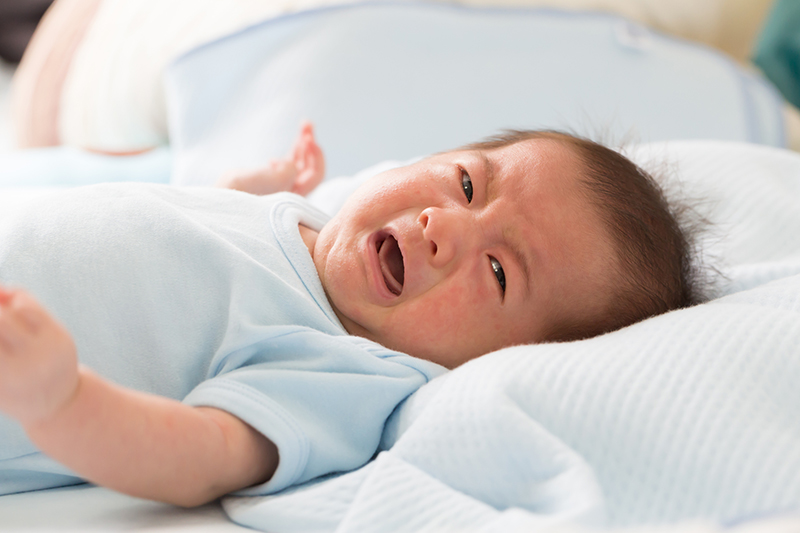Families For Life | Colic: What is It?-Newborn

Babies who cry or fuss a lot and can’t be settled are often described as having ‘colic’. We don’t know what causes colic, but we do know it can be hard to handle.
Colic symptoms
If you have a baby, you might know the symptoms of colic – crying and fussing. At some stage after your baby arrives home – it might be a few days, or sometimes a few weeks – the crying starts.
Your baby is restless and cranky, and doesn’t seem to settle into a predictable routine of sleeping and feeding. Many parents find this unpredictability very hard to cope with.
Your baby might feed hungrily, but soon after a feed seems to be hungry again. Or your baby might not feed well, often fussing at the breast or bottle.
You might find that your baby spends long periods unsettled or grizzling, but might also cry very loudly. During this crying period, your baby might draw her legs up, as if in pain. It’s very difficult to settle or comfort your baby when she’s in this state. She might be inconsolable – nothing you do seems to make any difference.
The crying and fussing might seem to go on for hours, and it’s often worse in the evening.
A few babies with ‘colic’ symptoms might have medical problems, so it’s a good idea to see your General Practitioner (GP).
Crying and fussing: what to expect
On average, typical babies cry and fuss for almost three hours a day – and some for a lot longer than this. The crying reaches a peak at about six weeks of age, and then gradually lessens as babies get older.
Most of this crying and fussing seems to happen in the late afternoon and evening, although this can change from day to day.
Younger babies cry because of their temperament, sleeping cycles and feeding patterns. As babies get older, their crying is more about communicating with you or about something in their environment. Because of this, it’s more likely to be spread throughout the day.
Infant crying and fussing is a normal part of development, which typically gets better with time, whatever you do. Crying and fussing have little or nothing to do with how good you are at parenting. The most confident and calm parents also have babies who cry a lot.
Causes of colic
We still don’t know much about what causes colic.
Some people think it’s caused by medical conditions in the baby. Others think it’s to do with mums and dads being anxious – which is understandable, if they’ve got a baby who won’t settle!
There’s no clear evidence of a separate condition that is ‘colic’. Some babies do cry more and are harder to settle than others, just as some babies sleep more than others.
We do know that most ‘colicky’ babies have no obvious physical or medical cause for their crying.
People might tell you the crying is because of:
feeding techniques – too little or too much milk, or milk given in the wrong way
emotional problems in the mother
a difficult temperament in the baby
too much wind, although this has never been proven to cause crying. It’s more likely that ‘wind’ is the result rather than the cause of crying – crying causes the baby to swallow air.
Some of the medical reasons given for fussing and crying include:
gastrointestinal problems – for example, gastroesophageal reflux or excess gas
infections – for example, ear infections or urinary tract infections
hernias – for example, inguinal or umbilical hernias
nerves – for example, an irritable nervous system or neurological immaturity
allergy to mother’s diet or to cow’s milk
diaper rash and other sources of irritation.
Colic is very upsetting for you, and often frustrating for other carers, doctors and nurses as well. If you feel stressed or anxious, you won’t cause crying and fussing in your baby, although it can make crying worse.
© raisingchildren.net.au, translated and adapted with permission
Explore more